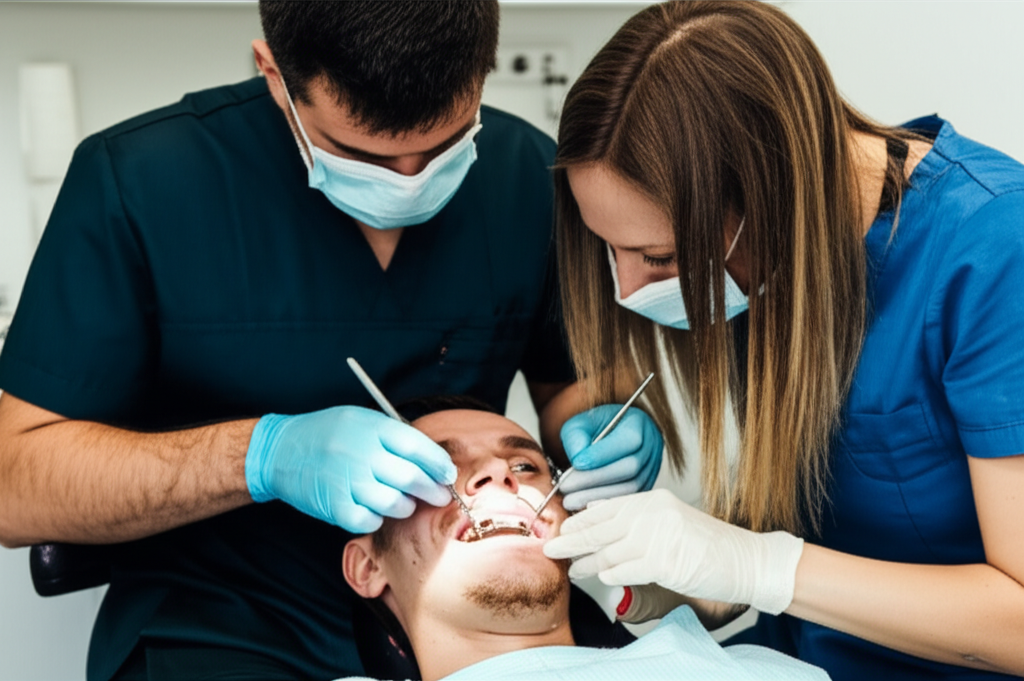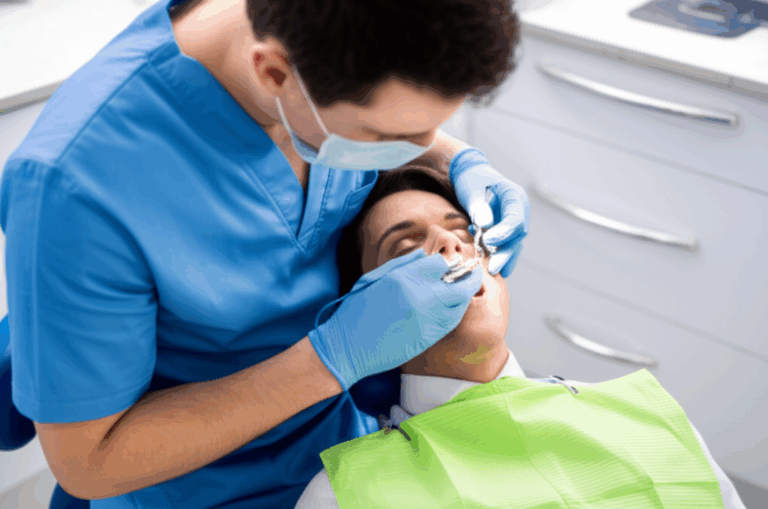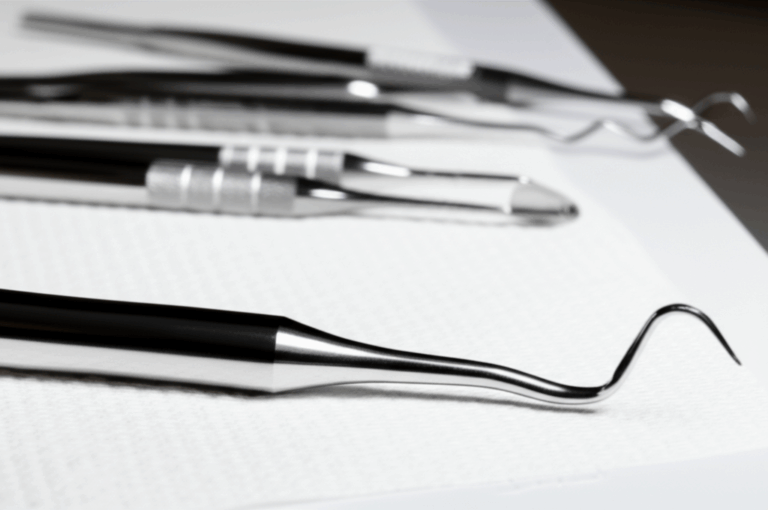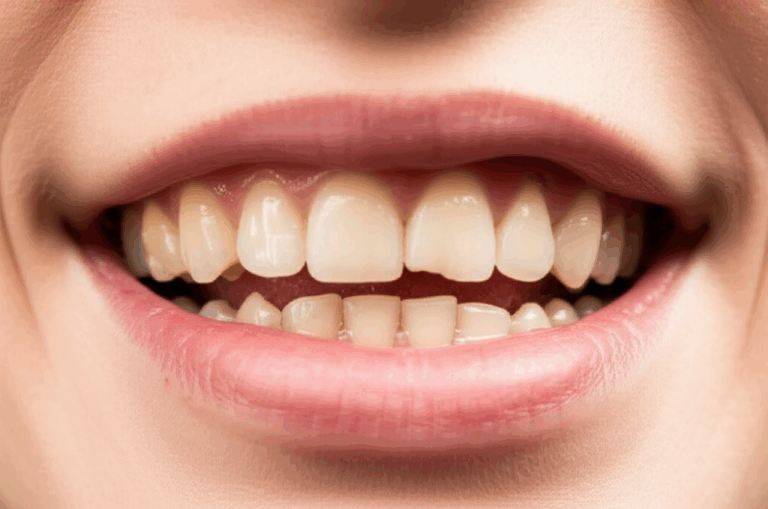
What’s the Difference: Dentist vs. Dental Hygienist?
Have you ever left a dental checkup feeling a little unsure about who did what? Maybe the cheerful person who cleaned your teeth wasn’t the same as the one who looked at your x-rays and talked to you about your overall mouth health. If you’ve ever wondered, “What’s the difference between a dentist and a dental hygienist?”—you’re not alone. Lots of people have this question.
Let me tell you: wanting to understand who cares for your teeth is smart and totally normal. Knowing what each person does can help you feel better at your next appointment and could help if you’re thinking about a job in dentistry.
In This Article
- Understanding the Main Roles in Your Dental Team
- Schooling and Training: A Closer Look
- Main Duties and What Each Does
- How Dentists and Dental Hygienists Work Together
- Salary and Job Facts
- Picking a Job: Dentist or Dental Hygienist
- Frequently Asked Questions (FAQs)
- Conclusion: Both Are Important for Your Smile
Understanding the Main Roles in Your Dental Team
Let’s start simple. When you go into a dental office, you’ll meet a team of trained people. The key players are dentists and dental hygienists. They both keep your mouth healthy, but their schooling, daily jobs, and job titles are different.
The Dentist: Think of the dentist as the leader of the team—figuring out problems, deciding on the best treatment, and doing things like fillings, root canals, and crowns. Dentists go through lots of tough classes and hands-on learning. They can check your teeth, gums, and jaw, spot signs of oral cancer, check for gum disease, and even do surgeries.
The Dental Hygienist: Hygienists are all about stopping problems before they start. Usually, they’re the ones who welcome you, check your dental history, and clean your teeth. Think of them like your tooth coach—they keep disease away and help your gums and teeth stay strong. They clean your teeth, show you how to take care of your mouth, and look for possible trouble, but they don’t tell you what disease you have or fix big problems.
An Example: If your mouth was a garden, the dental hygienist is the gardener, making sure everything is healthy and clean. The dentist is the garden planner—solving big problems and fixing things when they break.
Schooling and Training: A Closer Look
The school needed for each job shows a clear difference.
Becoming a Dentist: Lots of School and Practice
To be a dentist, you’ll need to:
- Get a college degree (usually in science) – 4 years
- Go to dental school (4 more years), finishing with either a Doctor of Dental Surgery (DDS) or Doctor of Dental Medicine (DMD) degree
- Pass several tough tests
- If you want to specialize (like braces, surgery, or kids’ dentistry), you’ll need up to 6 more years of extra training
That means at least 8 years in school, maybe more, plus hard tests. It’s a big commitment of time and money, but dentists can do a lot more in the office and are in charge.
Becoming a Dental Hygienist: Focused on Prevention
Dental hygienists go through less school but still need strong training:
- Most get a 2- to 3-year associate degree in dental hygiene
- Some get a 4-year bachelor’s degree for more senior jobs
- All must pass state tests and keep learning to stay licensed
It’s a faster and cheaper path than becoming a dentist, but hygienists still learn lots about teeth and mouth health, disease prevention, and helping patients. They’re real pros at what they do.
Main Duties and What Each Does
Let’s dig into who does what! This is where people usually get mixed up, so here’s an easy list.
What Dentists Do Every Day
Find Problems: Dentists look at your teeth and gums, check x-rays, and spot anything wrong—from simple cavities to suspicious bumps that might need more checking.
Plan Your Treatment: They make a step-by-step plan to fix your teeth, from fixing your bite to filling gaps.
Do Procedures: Dentists do things like fillings, pulling teeth, crowns and bridges, root canals, gum surgeries, and, if trained, putting in dental implants.
Write Prescriptions: Dentists can give you prescriptions for things like antibiotics and pain medicine.
Use Numbing Medicine: They use shots to numb your mouth and sometimes give stronger sedation.
Lead the Team: Dentists are the boss, making sure everyone (hygienists, assistants, lab workers) works well together.
Special Jobs: Some dentists work mainly with crowns and bridges, braces, or surgeries.
What Dental Hygienists Do Most
Clean Teeth: Hygienists are the experts who clean your teeth and gums by removing gunk and scraping away tartar.
Teach Patients: They show you how to brush, floss, and eat in ways that help your teeth.
Check Your Mouth: They screen your mouth and gums, take x-rays, write down any problems, and sometimes check for cancer signs.
Protect Teeth: They may put on fluoride or sealants and help sensitive teeth.
Watch for Problems: They notice changes in your mouth and will get the dentist if they see anything worrying.
> Note: Most times, hygienists can’t do big fixes (like fillings or pulling teeth) or tell you exactly what’s wrong—those are the dentist’s jobs.
Can a Dental Hygienist Do a Dentist’s Job?
In short: no. A dental hygienist can’t:
- Fill cavities
- Pull teeth
- Do crowns, bridges, or root canals
- Prescribe medicines
But, in some states, the rules are changing. Some experienced hygienists can numb your mouth for cleanings or work alone in out-of-the-way places—but always with limits.
How Dentists and Dental Hygienists Work Together
Think of your dental care like a relay. The dental hygienist starts by cleaning your teeth, checking for problems, and teaching you healthy habits. Then it’s the dentist’s turn—they check what the hygienist has found, tell you if there are any big issues, and plan what to do next.
Why does this teamwork matter?
- Faster visits: You get your cleaning, x-rays, and advice quickly and smoothly.
- Complete care: Problems are found early, when they are easier to fix.
- Better prevention: You learn to take better care of your teeth at home, thanks to your hygienist.
In a good office, this isn’t just about sharing tasks—it’s real teamwork. For example, you get a cleaning, and your hygienist notices your gums are puffy and there are deep pockets—a possible sign of gum disease. They’ll tell the dentist, who will look closer, decide what’s going on, and plan any steps to treat the problem.
Salary and Job Facts
Both dentists and dental hygienists are needed and can have great lives at work. But there are differences in pay, school time, and job openings.
Quick Comparison
| Feature | Dentist (DDS/DMD) | Dental Hygienist (RDH) |
|---|---|---|
| Schooling | 8+ years after high school | 2-4 years after high school |
| Licensing | State & national exams | State & national exams |
| Median Pay (BLS 2022) | $163,220 – $208,000+ | $87,530 – $93,000+ |
| Job Growth (10 yrs) | 4% (average) | 7% (faster than average) |
| Independence | Can own an office, lots of control | Usually works under dentist |
| Where They Work | Offices, hospitals, clinics | Offices, clinics, public settings |
| Can Prescribe? | Yes | No (may give numbing shots in some states) |
| Can Diagnose? | Yes | No |
What These Numbers Mean
- Dentists make more money—sometimes way more, especially if they own an office or have a special skill. But, they spend more time in school and often owe more money for loans.
- Dental Hygienists get paid well for a job that needs only 2 or 4 years of school. There are lots of openings, especially as more people go to the dentist.
- Life Balance: Hygienists often get steady hours (maybe three or four days a week) and don’t have to worry about running a business, while dentists may have more work and business duties.
Picking a Job: Dentist or Dental Hygienist
If you’re thinking about a job in dentistry, here’s what to think about.
What’s Best for You? Things to Think About
School Time:
- Dentist: At least eight years of school after high school.
- Dental Hygienist: Usually two to four years.
What You Like to Do:
- Dentists like diagnosing, solving tricky problems, and leading a team.
- Hygienists like stopping problems, teaching people, and hands-on work.
Where You Work:
- Dentists can run their own office, hire people, and pick a special field.
- Hygienists work in many places, but usually need some dentist oversight.
Pay and Moving Up:
- Dentists earn more and can take on more responsibility—but with more risk and cost.
- Hygienists make good money with less schooling and enjoy steady hours, but have fewer chances to move up.
Enjoying the Job:
Research shows both dentists and hygienists like their work. If you enjoy talking with patients, care about healthy teeth, and like teaching, dental hygiene could fit you. If you like solving tough problems, running your own business, or doing surgery, being a dentist may be better.
Real Example:
Lisa, a dental hygienist for 12 years, enjoys getting to know patients and helping them floss right. She likes having steady pay, regular hours, and not worrying about running a business.
Dr. Adam, her boss, thanks Lisa for helping patients stay healthy—he checks her notes and steps in for bigger problems, like a tooth that needs a root canal. They both matter a lot, but have different jobs.
Frequently Asked Questions (FAQs)
1. Can a dental hygienist fill cavities or fix my tooth?
No. Only a dentist can fill cavities, put on crowns or bridges, or do root canals.
2. Can a dental hygienist diagnose dental problems?
Hygienists can spot signs of trouble, but only dentists can give a real diagnosis. Hygienists tell the dentist about anything weird they see.
3. Who should I see for a dental cleaning?
Dental hygienists are the cleaning experts. They do most of the professional cleanings and help prevent problems.
4. If I have a big dental problem, do I still see the hygienist?
Yes—they can help keep your mouth clean, even if you’re getting treatment. But if you need a diagnosis or dental work, see the dentist.
5. What’s the difference between a dental assistant and a dental hygienist?
Good question! Dental assistants help set up, clean tools, and help the dentist during treatments. They don’t do cleanings or in-depth teaching—that’s the hygienist’s job.
Case Study: How the Dental Team Works
A patient comes in for their routine visit.
Step 1: The dental hygienist welcomes them, goes over their health details, takes x-rays, and gives a detailed cleaning, writing down any concerns—maybe some gum problems or a spot on an x-ray.
Step 2: The dentist reads the hygienist’s notes, looks at the patient, and makes any needed decisions—like warning about a possible cavity under an old filling. Both work together to keep the patient’s mouth healthy.
Teamwork is what keeps the patient’s smile happy.
Collaboration With Dental Specialists and Labs
Dentists often need help from outside experts who make crowns, bridges, dentures, or implants to fix a patient’s teeth. For example, a dental ceramics lab may make custom crowns, while an implant dental laboratory creates special pieces for replacing teeth. Good dentists and hygienists know it’s important to stick with great labs for the best results.
Your Healthy Takeaway
Here’s what counts about the difference between a dentist and a dental hygienist:
- Dentists find, treat, and fix big dental problems; they spend more years in school and usually lead the dental team.
- Dental hygienists stop problems before they start and teach you how to care for your teeth; they handle cleanings and support your daily health.
- Both are needed to keep your mouth healthy and your smile bright.
- They work together, using their own skills to give you great care.
- Ask questions—knowing who does what helps things go better for everyone involved.
What should you do next?
- Keep up your check-ups with both dentist and dental hygienist. It’s easier and cheaper to stop problems than fix them.
- Brush well, floss every day, and don’t eat too many sugary snacks.
- If you’re not sure who does what, just ask—they like helping you learn.
Want to learn more about things like digital dental lab technology, or what’s new with implants? Check out our other articles for fresh info.
Your best smile starts with understanding—so ask, keep learning, and always look after your oral health!








